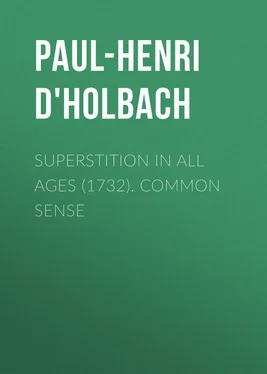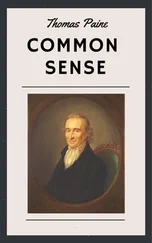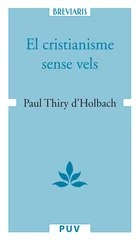Paul-Henri Holbach - Superstition In All Ages (1732). Common Sense
Здесь есть возможность читать онлайн «Paul-Henri Holbach - Superstition In All Ages (1732). Common Sense» — ознакомительный отрывок электронной книги совершенно бесплатно, а после прочтения отрывка купить полную версию. В некоторых случаях можно слушать аудио, скачать через торрент в формате fb2 и присутствует краткое содержание. Жанр: Философия, literature_18, foreign_prose, на французском языке. Описание произведения, (предисловие) а так же отзывы посетителей доступны на портале библиотеки ЛибКат.
- Название:Superstition In All Ages (1732). Common Sense
- Автор:
- Жанр:
- Год:неизвестен
- ISBN:нет данных
- Рейтинг книги:3 / 5. Голосов: 1
-
Избранное:Добавить в избранное
- Отзывы:
-
Ваша оценка:
- 60
- 1
- 2
- 3
- 4
- 5
Superstition In All Ages (1732). Common Sense: краткое содержание, описание и аннотация
Предлагаем к чтению аннотацию, описание, краткое содержание или предисловие (зависит от того, что написал сам автор книги «Superstition In All Ages (1732). Common Sense»). Если вы не нашли необходимую информацию о книге — напишите в комментариях, мы постараемся отыскать её.
Superstition In All Ages (1732). Common Sense — читать онлайн ознакомительный отрывок
Ниже представлен текст книги, разбитый по страницам. Система сохранения места последней прочитанной страницы, позволяет с удобством читать онлайн бесплатно книгу «Superstition In All Ages (1732). Common Sense», без необходимости каждый раз заново искать на чём Вы остановились. Поставьте закладку, и сможете в любой момент перейти на страницу, на которой закончили чтение.
Интервал:
Закладка:
XXVII. – REMARKABLE CONTRADICTIONS OF THEOLOGY
Religion puts men on their knees before a being without extension, and who, notwithstanding, is infinite, and fills all space with his immensity; before an almighty being, who never executes that which he desires; before a being supremely good, and who causes but displeasure; before a being, the friend of order, and in whose government everything is in disorder. After all this, let us conjecture what this God of theology is.
XXVIII. – TO ADORE GOD IS TO ADORE A FICTION
In order to avoid all embarrassment, they tell us that it is not necessary to know what God is; that we must adore without knowing; that it is not permitted us to turn an eye of temerity upon His attributes. But if we must adore a God without knowing Him, should we not be assured that He exists? Moreover, how be assured that He exists without having examined whether it is possible that the diverse qualities claimed for Him, meet in Him? In truth, to adore God is to adore nothing but fictions of one's own brain, or rather, it is to adore nothing.
XXIX. – THE INFINITY OF GOD AND THE IMPOSSIBILITY OF KNOWING THE DIVINE ESSENCE, OCCASIONS AND JUSTIFIES ATHEISM
Without doubt the more to perplex matters, theologians have chosen to say nothing about what their God is; they tell us what He is not. By negations and abstractions they imagine themselves composing a real and perfect being, while there can result from it but a being of human reason. A spirit has no body; an infinite being is a being which is not finite; a perfect being is a being which is not imperfect. Can any one form any real notions of such a multitude of deficiencies or absence of ideas? That which excludes all idea, can it be anything but nothingness? To pretend that the divine attributes are beyond the understanding of the human mind is to render God unfit for men. If we are assured that God is infinite, we admit that there can be nothing in common between Him and His creatures. To say that God is infinite, is to destroy Him for men, or at least render Him useless to them.
God, we are told, created men intelligent, but He did not create them omniscient: that is to say, capable of knowing all things. We conclude that He was not able to endow him with intelligence sufficient to understand the divine essence. In this case it is demonstrated that God has neither the power nor the wish to be known by men. By what right could this God become angry with beings whose own essence makes it impossible to have any idea of the divine essence? God would evidently be the most unjust and the most unaccountable of tyrants if He should punish an atheist for not knowing that which his nature made it impossible for him to know.
XXX. – IT IS NEITHER LESS NOR MORE CRIMINAL TO BELIEVE IN GOD THAN NOT TO BELIEVE IN HIM
For the generality of men nothing renders an argument more convincing than fear. In consequence of this fact, theologians tell us that the safest side must be taken; that nothing is more criminal than incredulity; that God will punish without mercy all those who have the temerity to doubt His existence; that His severity is just; since it is only madness or perversity which questions the existence of an angry monarch who revenges himself cruelly upon atheists. If we examine these menaces calmly, we shall find that they assume always the thing in question. They must commence by proving to our satisfaction the existence of a God, before telling us that it is safer to believe, and that it is horrible to doubt or to deny it. Then they must prove that it is possible for a just God to punish men cruelly for having been in a state of madness, which prevented them from believing in the existence of a being whom their enlightened reason could not comprehend. In a word, they must prove that a God that is said to be full of equity, could punish beyond measure the invincible and necessary ignorance of man, caused by his relation to the divine essence. Is not the theologians' manner of reasoning very singular? They create phantoms, they fill them with contradictions, and finally assure us that the safest way is not to doubt the existence of those phantoms, which they have themselves invented. By following out this method, there is no absurdity which it would not be safer to believe than not to believe.
All children are atheists – they have no idea of God; are they, then, criminal on account of this ignorance? At what age do they begin to be obliged to believe in God? It is, you say, at the age of reason. At what time does this age begin? Besides, if the most profound theologians lose themselves in the divine essence, which they boast of not comprehending, what ideas can common people have? – women, mechanics, and, in short, those who compose the mass of the human race?
XXXI. – THE BELIEF IN GOD IS NOTHING BUT A MECHANICAL HABITUDE OF CHILDHOOD
Men believe in God only upon the word of those who have no more idea of Him than they themselves. Our nurses are our first theologians; they talk to children of God as they talk to them of were-wolfs; they teach them from the most tender age to join the hands mechanically. Have the nurses clearer notions of God than the children, whom they compel to pray to Him?
XXXII. – IT IS A PREJUDICE WHICH HAS BEEN HANDED FROM FATHER TO CHILDREN
Religion is handed down from fathers to children as the property of a family with the burdens. Very few people in the world would have a God if care had not been taken to give them one. Each one receives from his parents and his instructors the God which they themselves have received from theirs; only, according to his own temperament, each one arranges, modifies, and paints Him agreeably to his taste.
XXXIII. – ORIGIN OF PREJUDICES
The brain of man is, especially in infancy, like a soft wax, ready to receive all the impressions we wish to make on it; education furnishes nearly all his opinions, at a period when he is incapable of judging for himself. We believe that the ideas, true or false, which at a tender age were forced into our heads, were received from nature at our birth; and this persuasion is one of the greatest sources of our errors.
XXXIV. – HOW THEY TAKE ROOT AND SPREAD
Prejudice tends to confirm in us the opinions of those who are charged with our instruction. We believe them more skillful than we are; we suppose them thoroughly convinced themselves of the things they teach us. We have the greatest confidence in them. After the care they have taken of us when we were unable to assist ourselves, we judge them incapable of deceiving us. These are the motives which make us adopt a thousand errors without other foundation than the dangerous word of those who have educated us; even the being forbidden to reason upon what they tell us, does not diminish our confidence, but contributes often to increase our respect for their opinions.
XXXV. – MEN WOULD NEVER HAVE BELIEVED IN THE PRINCIPLES OF MODERN THEOLOGY IF THEY HAD NOT BEEN TAUGHT AT AN AGE WHEN THEY WERE INCAPABLE OF REASONING
The instructors of the human race act very prudently in teaching men their religious principles before they are able to distinguish the true from the false, or the left hand from the right. It would be as difficult to tame the spirit of a man forty years old with the extravagant notions which are given us of Divinity, as to banish these notions from the head of a man who has imbibed them since his tenderest infancy.
XXXVI. – THE WONDERS OF NATURE DO NOT PROVE THE EXISTENCE OF GOD
We are assured that the wonders of nature are sufficient to a belief in the existence of a God, and to convince us fully of this important truth. But how many persons are there in this world who have the leisure, the capacity, the necessary taste, to contemplate nature and to meditate upon its progress? The majority of men pay no attention to it. A peasant is not at all moved by the beauty of the sun, which he sees every day. The sailor is not surprised by the regular movements of the ocean; he will draw from them no theological inductions. The phenomena of nature do not prove the existence of a God, except to a few forewarned men, to whom has been shown in advance the finger of God in all the objects whose mechanism could embarrass them. The unprejudiced philosopher sees nothing in the wonders of nature but permanent and invariable law; nothing but the necessary effects of different combinations of diversified substance.
Читать дальшеИнтервал:
Закладка:
Похожие книги на «Superstition In All Ages (1732). Common Sense»
Представляем Вашему вниманию похожие книги на «Superstition In All Ages (1732). Common Sense» списком для выбора. Мы отобрали схожую по названию и смыслу литературу в надежде предоставить читателям больше вариантов отыскать новые, интересные, ещё непрочитанные произведения.
Обсуждение, отзывы о книге «Superstition In All Ages (1732). Common Sense» и просто собственные мнения читателей. Оставьте ваши комментарии, напишите, что Вы думаете о произведении, его смысле или главных героях. Укажите что конкретно понравилось, а что нет, и почему Вы так считаете.












